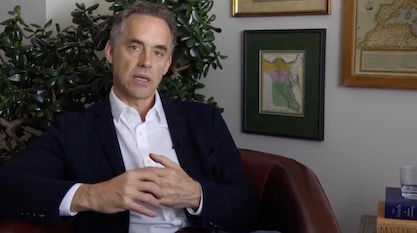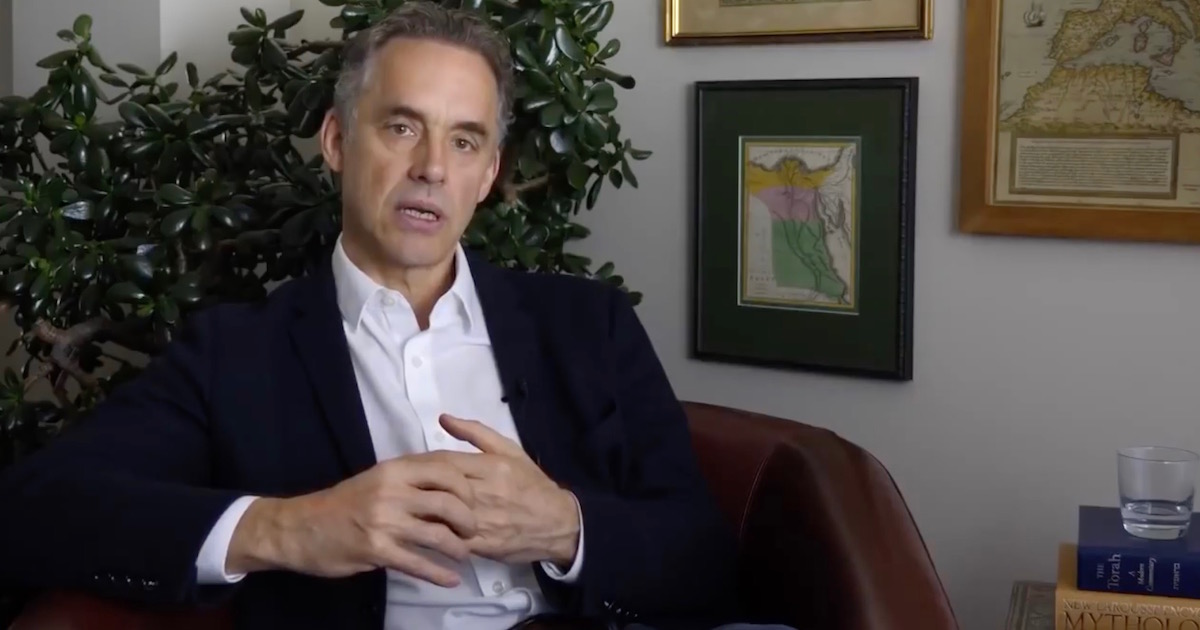 Evolution
Evolution
 Faith & Science
Faith & Science
 Free Speech
Free Speech
Jordan Peterson — Do the Stitches Hold?


Recently, David Klinghoffer drew attention to modern heretic Jordan B. Peterson, a once-obscure Canadian clinical psychologist and professor of psychology at the University Toronto (formerly of Harvard), who has achieved worldwide infamy for saying, as an academic, nothing more than what most people believe. Klinghoffer suggests that those in sympathy with intelligent design can learn from him: “unfailingly polite, unruffled, but razor sharp, deftly resisting manipulation and intimidation at every single step.” Indeed they can, and some background may be helpful.
Peterson is a lightning rod, with a half-million YouTube followers, 300,000 Twitter followers, and a bestselling book, 12 Rules for Life: An Antidote to Chaos. He violates political correctness in the most serious way: He has said that he will not use politically correct pronouns, now mandated under Canadian law. Worse, he made a British social justice warrior look ridiculous on television, elevating her persistent hectoring — “So what you’re saying is…” — to a commentariat classic in the art of dumbing down someone else’s argument so that it is easily rebutted.
In the post-modern social sciences academy, honestly acquired fact bases (for example, the fact base about biological differences between the sexes) must surrender to intense feelings. As David Solway notes, “influential postmodern leaders such as Jean-Francois Lyotard, Jacques Derrida, Michel Foucault, Richard Rorty and Jean Baudrillard are on record denying that objective or universal truth exists.” Peterson’s refusal to stop talking about data contrasts with the surrender of so many academics to intellectual suicide in exchange for tenure and peace. No wonder some of them would be happy if an old-fashioned data-driven practitioner like Peterson no longer had tenure at the University of Toronto.
Not surprisingly, he became a beacon for many outside the academy who seek to ground their lives in observed facts rather than approved opinions. Which brings us to his new book, currently ranked at #1 on Amazon’s “Most Sold” list. Any misgivings addressed below are offered alongside sincere admiration for a man who has, almost alone, stood up to a vast and angry academic herd.
I was surprised by the extent to which Peterson understands that the post-modern aversion to objectivity, which is killing the social sciences, is seeping into the harder sciences as well, offering the same promise: Social peace in exchange for intellectual suicide.
He identifies Jacques Derrida (1930–2004) as the key figure in destroying the idea that there are facts, apart from interpretations (“deconstruction”): “It is almost impossible to over-estimate the nihilistic and destructive nature of this philosophy. It puts the act of categorization itself in doubt. It negates the idea that distinctions might be drawn between things for any reasons other than that of raw power” and makes both logic and the techniques of science “merely part of the oppressive patriarchal system.”
Indeed. Some current controversies in cosmology over string theory and the multiverse are only comprehensible if we grasp the intense post-modern desire to have done with reason, logic, and evidence, and proclaim the cosmos that feels right to the cosmologists.
Observers often suppose that lack of evidence will doom post-modern cosmologies. They are mistaken. Left to themselves, post-modern cosmologies will doom evidence in theoretical physics in the same way that post-modern anthropologies have doomed evidence in some biology-dependent areas of social science.
Peterson is the type of prophet who tells us what is wrong; he doesn’t succeed in articulating a way forward. As a post-Christian, he “looks to the Bible, to evolution, to the behaviour of wild animals, to Freud and Jung and other great thinkers,” as the Daily Express puts it, and stitches them together into a self-help psychology.
The stitches do not hold. For example, it is not at all clear that Peterson believes in God, as commonly understood. Still, he offers: “But, metaphorically speaking, there is also this: you have a spark of the divine in you, which belongs not to you, but to God. We are, after all — according to Genesis — made in His image. We have the semi-divine capacity for consciousness.” So is there a God or not? Don’t we need to know that before we take Genesis seriously?
Similarly, he writes, “Christ’s archetypal death exists as an example of how to accept finitude, betrayal and tyranny heroically — how to walk with God despite the tragedy of self-conscious knowledge — and not as a directive to victimize ourselves in the service of others.” To a Catholic Christian like myself, that sounds like a tin pan dropped on a ceramic floor. One would hope to interject that Christ suffered a cross only he could bear, and it was not to deal with the sort of problems that can be addressed by self-help psychology.
Trying to meld the Bible with evolutionary psychology fares no better. One grieves while reading about Jane Goodall’s horrifying discovery that chimpanzees are unthinkingly cruel. But, if we are not wedded to Darwinian doctrines, what does chimpanzee behavior demonstrate that need matter to our human quest for a true way today?
Suppose we consider only the serious classical traditions Peterson draws from: Some Eastern traditions pursue the Way of Being, irrespective of the question of God. But the major Western traditions cannot avoid that question. The very fact that his well-meaning syncretism of the two is so seldom called out as impossible shows how poorly many people are educated today. Derrida has won. Categories of thought are now, for many, the enemy.
Peterson has an odd affection for Nietzsche, whose philosophy became infamous as a claimed impetus behind the Third Reich. But he uses the philosopher’s wide-ranging critiques in small doses. Nietzsche can be helpful in identifying what we now call virtue signaling, as opposed to virtuous actions. Still, one rather wishes that self-help writers would choose another source.
About the style of the book, Peter Hitchens, brother of the late Christopher Hitchens, comments: “Most of it is written in a conversational style intended to be friendly and accessible. But for anyone educated before the cultural revolution, used to the orderly architecture of argument, it slides about on the page like mental porridge.” Peterson’s approach probably works better on YouTube where, as Hitchens implicitly concedes, Peterson’s large following has never received any training from current educational institutions in the “orderly architecture of argument.”
Hitchens also predicts that Peterson’s brave stance won’t change anything: “Almost everything that was once derided as the work of the ‘loony left’ or ‘political correctness gone mad’ is observed daily in grand, expensive private schools and is the official policy of the Conservative and Unionist party, or soon will be.” Yes, the uproar is now principally around the fact that Peterson wants certain matters even discussed whereas others concede and grow quiet. They have lost the capacity to say, “No, let’s stop and talk about this.”
As a Canadian, I am troubled by the descent of historic national media into the gutter, denouncing Peterson without besmirching themselves by an effort to understand what he is saying (perhaps because they cannot?). Recent items warn readers against following the discussion seriously. Maclean’s asks, “Is Jordan Peterson the stupid man’s smart person?” while The Walrus calls him “The Professor of Piffle” and the Globe and Mail sniffs at his “faintly flickering intellect.”
The now-fading traditional media put one in mind of H.L. Mencken. He first alerted the world to a fact that shocked him: Many doubted the Darwinian account of human origins, as demonstrated by the 1925 Scopes Trial. “Neanderthal man is organizing in these forlorn backwaters of the land, led by a fanatic, rid of sense and devoid of conscience.” Mencken was a clever writer but also a narrow and vicious snob who got the future trajectory of anti-intellectualism quite wrong. The war on the life of the mind was not an invasion from the hills of flyover country; it was seeping, and later gushing, from grad seminars, journalism schools, and political internships.
One could almost say, Academy man is organizing in these parts, led by intellectual freedom opponents, rid of mathematics and devoid of science.
Those of us who think design in nature is worthy of study can learn something from the academy’s reaction to Peterson. One often suspects that most of the people who are enraged by the idea of design don’t actually know a well-thought-out reason for thinking it wrong. But they don’t feel they need to know one either. Like Peterson’s foes, they have fixed their target, frozen, framed, and polarized it. Doing so is the only intellectual achievement they respect.
Even if Peterson himself fades from view in a year or two, the war on intellectual freedom that his story highlights requires a response: Either we recommit to the values that created the modern university or we look elsewhere for intellectual guidance, leaving those storied halls to crumble, each in its own miserably angry way.
And if we do nothing? If, for example, Christianity and Judaism are fading from the Western world, it will be ruled not by gentle humanists but by the likes of Peterson’s persecutors: people at war with humanity, nature, and reality, seemingly determined to make the rest of us pay for their apparently unfathomable unhappiness.
Photo: Jordan Peterson, via YouTube.
